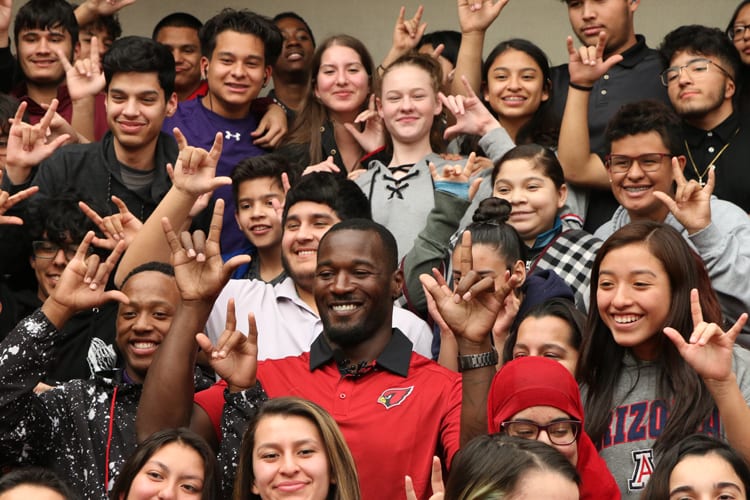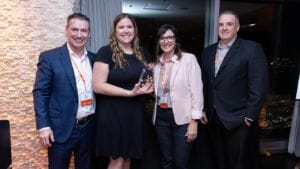The vibrations of a drum and the cheers of students resound through a packed gymnasium.
Those vibrations are what some in the crowd rely on to feel what others can hear.
Arizona Cardinals fullback Derrick Coleman, the first legally deaf offensive player in the NFL, took a microphone at the Phoenix Day School for the Deaf and spoke. Next to him, an interpreter used sign language to communicate Coleman’s message to the crowd.
He hopes to use his national platform to inspire.
“All of you guys have something that I didn’t have: people next to you that have the same problem as you,” Coleman said Tuesday.
Coleman never learned how to sign because his family didn’t want him to feel as if he is different. His message was simple: “Be the best you can be.”
The player, who was joined by mascot Big Red and two Cardinals cheerleaders, fielded questions from the crowd.
“Have you won a lot this year?” a student asked.
“This year I haven’t won a lot,” Coleman said amid laughter. “When you win, it feels really good.”
The Cardinals are 2-9 this NFL season.
The former Vikings, Seahawks and Falcons player signed a one-year contract with the Cardinals in May. He has played in 56 games during his five NFL seasons and was a Super Bowl champion with Seattle in 2014.
His 2018 season has been less than prolific, totaling 20 yards of offense on two carries and two receptions.
But that doesn’t seem to faze Coleman, who said he overcame adversity by “staying positive and believing in myself.”
“There were times when I wanted to quit … but my friends, my family, they said no,” he said.
Coleman has a Super Bowl ring, which he doesn’t wear out of fear of losing it, but he still takes joy in sharing his story with others.
“Now I know that I’m not alone,” Coleman said. “Everything you’re going through, I’ve been through.”
Coleman said that everybody has problems and nobody’s perfect in the world.
“Everyone has something to overcome,” said Coleman, who began losing his hearing when he was only 3 and was bullied while he was growing up.
Coleman said it was in college at UCLA when he first realized how influential he could be. He was asked to speak to local high school kids about his journey.
“They’re going through exactly what I’ve been through,” Coleman said he thought at the time.
“If I talk to a hundred kids and only get to one, that’s good with me because that’s a domino effect,” Coleman said.
That’s why he wrote his book “No Excuses: Growing up Deaf and Achieving my Super Bowl Dreams.”
He also runs the Derrick L. Coleman Jr. No Excuse Foundation. The foundation’s objective is to “support, educate and advocate for the hearing-impaired community as they move to integrate into mainstream society.”
Sherri Collins, the executive director for the Arizona Commission for the Deaf and the Hard of Hearing, helped put together the event at the PDSD.
“The goal is to improve quality of life for those who are deaf and hard of hearing in the state of Arizona,” Collins said. “It doesn’t mean because of our hearing loss, we can’t dream big.”
The ACDHH serves the 1.1 million deaf and hard of hearing community in Arizona, with the intention of providing community involvement and partnerships with local agencies and organizations.
“It’s important that the kids have the opportunity to meet someone who was very successful and overcame his challenges,” Collins said. “It’s an ongoing education and awareness to the general public.”
Courtney Fritz, principal at PDSD, said Coleman inspires and motivates the school’s students.
“To see people, who they really look up to in the community, come and take time out of their day to visit them here in their own environment just means a lot,” she said.
PDSD is part of the Arizona State Schools for the Deaf and the Blind, a state agency that serves more than 2,000 children from birth to 22 years, who are deaf, hard of hearing, blind, visually impaired or deafblind.
Fritz said she would like to see increased awareness of deaf and hard of hearing students.
“Showing the community that our kids can do just everything that any other kid in the state of Arizona can do,” she said. “Having them be provided the same opportunity.”
That is what Coleman’s appearance at the pep rally was all about and he returned to his theme, urging students to be themselves and be the best that they can be.
“The world is going to judge you good or bad,” Coleman said. “The best thing you can do is be yourself.”




